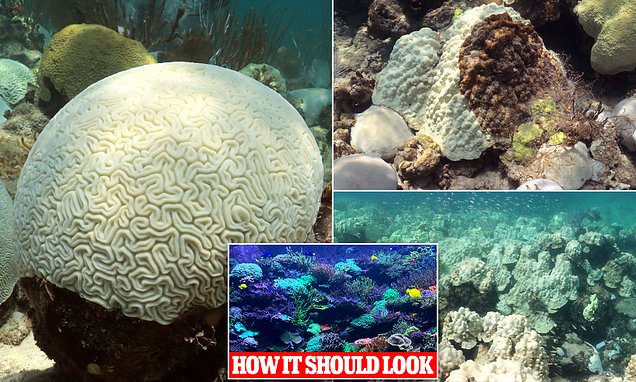Coral grief: Shocking photos show how once brightly-colored ocean organisms have been bleached WHITE by record water temperatures off Florida coast
- The pictures were taken by divers from NOAA’s Atlantic Oceanographic & Meteorological Lab around the Cheeca Rocks reef
- The corals, which are meant to be bursting with color, look white and sickly early in the summer season, which has seen the earth’s oceans face record temperatures
- ‘I’ve never seen anything like it,’ said Ian Enochs, the lead ecologist of NOAA’s AOML coral program
A set of shocking photos from the Florida Keys has shown a coral reef that has been bleached completely white due to record temperatures, with scientists concerned about future sustainability.
The pictures were taken by divers from NOAA’s Atlantic Oceanographic & Meteorological Lab around the Cheeca Rocks reef, just east of the Florida Keys.
The corals, which are meant to be bursting with color, look white and sickly early in the summer season, which has seen the earth’s oceans face record temperatures.
‘I’ve never seen anything like it,’ said Ian Enochs, the lead ecologist of NOAA’s AOML coral program.
‘The corals at our primary climate monitoring reef site, Cheeca Rocks, are completely bleached. No single coral is untouched. It’s shocking.’
A set of shocking photos from the Florida Keys has shown a coral reef that has been bleached completely white due to record temperatures, with scientists concerned about future sustainability
The corals, which are meant to be bursting with color, look as white as a volleyball early in the summer season, which has seen the earth’s oceans face record temperatures
The lack of color is due to heat stress and is no surprise considering the Sunshine State has seen temperatures running three to five degrees above normal, according to the Washington Post.
When it gets too hot in the ocean, algae produces toxins that have to be expelled by coral, according to experts.
That heat stress happens when the water reaches 88 degrees but with the heat wave especially extreme this summer, some temperatures have been in the 90s.
That heat dome in Florida has caused underwater temperatures of anywhere from 92 to 96 degrees in the Keys.
The NOAA’s Coral Reef Watch has set itself at ‘Alert Level 1,’ the second-highest it can be.
‘I’m worried because it’s so early in the season, and they may continue to be stressed for some time,’ Enochs said.
Bleaching was expected due to the El Nino weather system but this is beyond what biologists predicted.
The pictures were taken by divers from NOAA’s Atlantic Oceanographic & Meteorological Lab around the Cheeca Rocks reef, just east of the Florida Keys
When it gets too hot in the ocean, algae produces toxins that have to be expelled by coral, according to experts
That heat stress happens when the water reaches 88 degrees but with the heat wave especially extreme this summer, some temperatures have been in the 90s
The lack of color is due to heat stress and is no surprise considering the Sunshine State has seen temperatures running three to five degrees above normal
‘This is more bleaching than I’ve seen, earlier than I’ve ever seen it,’ Enochs added.
‘We still have a warm South Florida summer ahead of us, which means more stressful conditions.’
The coral could face tough times well into October throughout the Caribbean and the Gulf of Mexico.
Enochs noted that bleaching doesn’t always kill the corals, which can recover once temperatures cool down.
That would allow the algae population to replenish and help bring the coral back to full health.
With August, as usual, set to be the hottest month of the year for Floridians, it’s going to be a tough time for the coral until then.
Summer 2023 is adding more worrying records to the history books, with the world’s oceans hitting their hottest ever recorded temperature, scientists have revealed.
The coral could face tough times well into October throughout the Caribbean and the Gulf of Mexico
Experts noted that bleaching doesn’t always kill the corals, which can recover once temperatures cool down
With August, as usual, set to be the hottest month of the year for Floridians, it’s going to be a tough time for the coral until then
Data from the EU’s Copernicus program shows that the average sea temperatures this week hit 69.72°F, beating a record of 69.71°F set in March 2016.
Average sea temperatures have been climbing steadily since the 1970s, the data reveals, due to greenhouse gases trapping more heat and making the water feel ‘like a bath’, according to one expert.
Global air surface temperatures for July 2023 were also expected to make it the hottest month on record.
The new data follows the hottest June on record and extreme weather events, including heatwaves in Europe, North America and Asia and wildfires in Canada and Greece.
Source: Read Full Article











